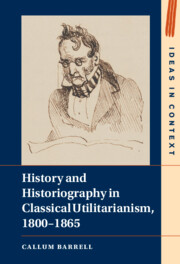Book contents
- History and Historiography in Classical Utilitarianism, 1800–1865
- Ideas in Context
- History and Historiography in Classical Utilitarianism, 1800–1865
- Copyright page
- Dedication
- Epigraph
- Contents
- Acknowledgements
- Conventions
- Introduction
- Part I Enlightened Historicisms
- Part II Historicism and Historiography
- Part III Sciences of History
- Chapter 5 J. S. Mill and Historical Relativism
- Chapter 6 J. S. Mill on Universal History
- Conclusion
- Bibliography
- Index
Chapter 6 - J. S. Mill on Universal History
from Part III - Sciences of History
Published online by Cambridge University Press: 24 September 2021
- History and Historiography in Classical Utilitarianism, 1800–1865
- Ideas in Context
- History and Historiography in Classical Utilitarianism, 1800–1865
- Copyright page
- Dedication
- Epigraph
- Contents
- Acknowledgements
- Conventions
- Introduction
- Part I Enlightened Historicisms
- Part II Historicism and Historiography
- Part III Sciences of History
- Chapter 5 J. S. Mill and Historical Relativism
- Chapter 6 J. S. Mill on Universal History
- Conclusion
- Bibliography
- Index
Summary
This chapter examines J. S. Mill’s writings on universal history, beginning with his reviews of Jules Michelet, François Guizot, and Henry Buckle, and ending with Alexis de Tocqueville’s prophetic account of democracy and Mill’s timely socialism. Barrell argues that we must take seriously the two historical perspectives from which Mill theorised politics: the first looked to the special causes which determined the timeliness or untimeliness of a given doctrine, reform, or phenomenon, while the latter looked to general causes and the region of ultimate aims. The first depended logically on the second. Any attempt to historicise the study of politics – by making laws relative to time and place, for example – must reckon with civilisation’s provisional trends. The debate surrounding Mill’s universalism and relativism, Barrell concludes, can be helpfully understood in these terms. While Mill’s argument is difficult to credulously follow, his intentions were clear: general and special circumstances always coexisted, and because they coexisted the past was both irreducibly distinct and uniform in its development. One consequence of this intellectual remapping might be to re-establish continuities between the eighteenth and nineteenth centuries, in keeping with Mill’s self-professed eclecticism.
Keywords
- Type
- Chapter
- Information
- Publisher: Cambridge University PressPrint publication year: 2021

